A tux is a type of formal dress.
Contents
Tux or TUX may also refer to:
A tux is a type of formal dress.
Tux or TUX may also refer to:

Mandriva Linux is a discontinued Linux distribution developed by Mandriva S.A.

Tux Racer is a 2000 open-source winter sports racing video game starring the Linux mascot, Tux the penguin. It was originally developed by Jasmin Patry as a computer graphics project at a Canadian university. Later on, Patry and the newly founded Sunspire Studios, composed of several former students of the university, expanded it. In the game, the player controls Tux as he slides down a course of snow and ice collecting herring.
Longhorn may refer to:
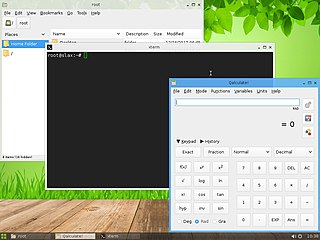
Slax is a LiveCD Linux distribution developed by Tomáš Matějíček and based on upstream customizable Linux distributions. Packages can be added by apt package manager or can be prepared as modules. The tagline for Slax refers to itself as "your pocket operating system".
A comet is a small astronomical body which orbits the sun.

SuperTux is a free and open-source two-dimensional platform video game published under the GNU General Public License (GPL). The game was inspired by Nintendo's Super Mario Bros. series; instead of Mario, the hero in the game is Tux, the official mascot of the Linux kernel.
The TUX web server is an unmaintained in-kernel web server for Linux licensed under the GNU General Public License (GPL). It was maintained by Ingo Molnár.
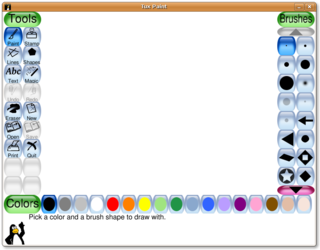
Tux Paint is a free and open source raster graphics editor geared towards young children. The project was started in 2002 by Bill Kendrick who continues to maintain and improve it, with help from numerous volunteers. Tux Paint is seen by many as a free software alternative to Kid Pix, a similar proprietary educational software product.
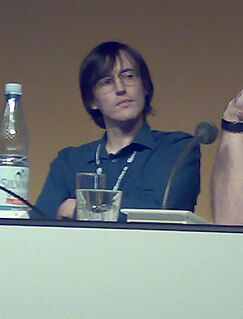
Larry Ewing is an American computer programmer who is known as the creator of the Linux mascot, Tux. The artwork was created in 1996, while Ewing was a student at Texas A&M University, originally as a submission to a contest to create the Linux logo. Though Ewing's submission didn't win, his artwork was adopted as the Linux "brand character". Ewing also created the Ximian and Mono monkey logos and is involved in:

Linux XP was a Fedora Linux-based shareware Linux distribution designed to imitate Windows environment using GNOME desktop; it could run some Microsoft Windows programs using the Wine compatibility layer. Linux XP had to be registered within 99 bootings after installation, or the OS would deactivate.

RadioTux is a German internet radio show. The topics are mostly around free and open source software, free operating systems like *BSD and Linux, as well as on sociopolitical issues. It was founded in 2001.

SuperTuxKart (STK) is a free and open-source kart racing game, distributed under the terms of the GNU General Public License, version 3. It features mascots of various open-source projects. SuperTuxKart is cross-platform, running on Linux, macOS, Windows, iOS (beta), Android systems and Nintendo Switch (homebrew).

Tux, of Math Command is an open source arcade-style video game for learning arithmetic, initially created for Linux.
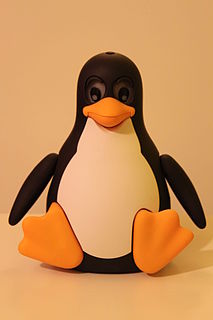
Tux Droid is a Linux wireless Tux mascot with a programmable interface, allowing it to announce events by its gestures and by ALSA driven sound. The events are detected by specific gadgets, which are handled by the Tux Gadget Manager. The Tux Droid supports Linux kernel 2.4 or later and needs an 800 MHz CPU and 128 MB RAM. Communication from Tux Droid to the computer is via signalling operating in the 802.11 WLAN band, but not compatible with Wi-Fi. The receiver resembles a plastic fish, and connects to the host computer's USB port. An infrared remote control is supplied; signals from this are received by Tux Droid and sent to the host software over the wireless link. For media detection it needs an internet connection. The mascot is driven by Atmel AVR RISC microcontrollers. The new version supports also Windows-based PCs. The Tux Droid can be used with Windows XP and Windows Vista.

cowsay is a program that generates ASCII art pictures of a cow with a message. It can also generate pictures using pre-made images of other animals, such as Tux the Penguin, the Linux mascot. It is written in Perl. There is also a related program called cowthink, with cows with thought bubbles rather than speech bubbles. .cow files for cowsay exist which are able to produce different variants of "cows", with different kinds of "eyes", and so forth. It is sometimes used on IRC, desktop screenshots, and in software documentation. It is more or less a joke within hacker culture, but has been around long enough that its use is rather widespread. In 2007, it was highlighted as a Debian package of the day.
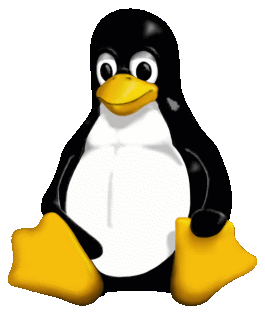
Tux is a penguin character and the official brand character of the Linux kernel. Originally created as an entry to a Linux logo competition, Tux is the most commonly used icon for Linux, although different Linux distributions depict Tux in various styles. The character is used in many other Linux programs and as a general symbol of Linux.

Smuxi is a cross-platform IRC client for the GNOME desktop inspired by Irssi. It pioneered the concept of separating the frontend client from the backend engine which manages connections to IRC servers inside a single graphical application.
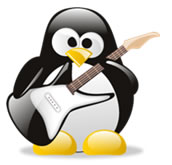
TuxGuitar is a free and open-source tablature editor, which includes features such as tablature editing, score editing, and import and export of Guitar Pro gp3, gp4, and gp5 files. In addition, TuxGuitar's tablature and staff interfaces function as basic MIDI editors.